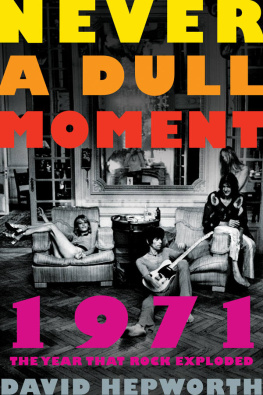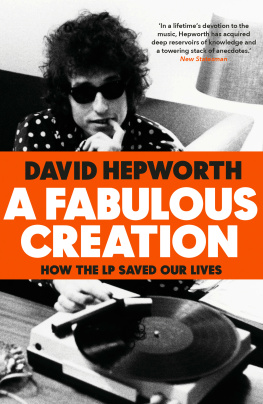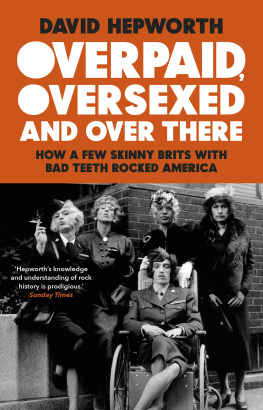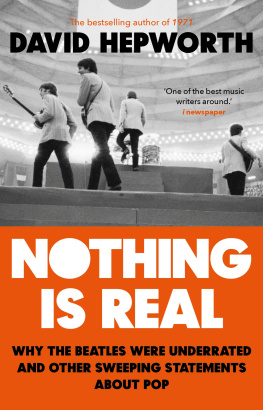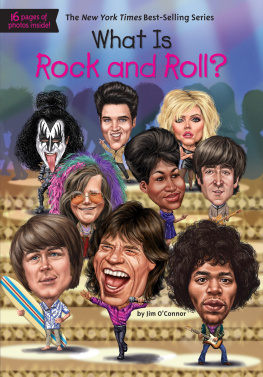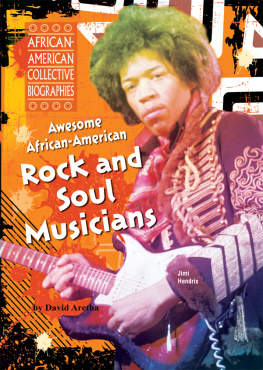David Hepworth - Never a Dull Moment: 1971, The Year That Rock Exploded
Here you can read online David Hepworth - Never a Dull Moment: 1971, The Year That Rock Exploded full text of the book (entire story) in english for free. Download pdf and epub, get meaning, cover and reviews about this ebook. year: 2017, publisher: Black Swan, genre: Detective and thriller. Description of the work, (preface) as well as reviews are available. Best literature library LitArk.com created for fans of good reading and offers a wide selection of genres:
Romance novel
Science fiction
Adventure
Detective
Science
History
Home and family
Prose
Art
Politics
Computer
Non-fiction
Religion
Business
Children
Humor
Choose a favorite category and find really read worthwhile books. Enjoy immersion in the world of imagination, feel the emotions of the characters or learn something new for yourself, make an fascinating discovery.
- Book:Never a Dull Moment: 1971, The Year That Rock Exploded
- Author:
- Publisher:Black Swan
- Genre:
- Year:2017
- Rating:4 / 5
- Favourites:Add to favourites
- Your mark:
- 80
- 1
- 2
- 3
- 4
- 5
Never a Dull Moment: 1971, The Year That Rock Exploded: summary, description and annotation
We offer to read an annotation, description, summary or preface (depends on what the author of the book "Never a Dull Moment: 1971, The Year That Rock Exploded" wrote himself). If you haven't found the necessary information about the book — write in the comments, we will try to find it.
David Hepworth: author's other books
Who wrote Never a Dull Moment: 1971, The Year That Rock Exploded? Find out the surname, the name of the author of the book and a list of all author's works by series.
Never a Dull Moment: 1971, The Year That Rock Exploded — read online for free the complete book (whole text) full work
Below is the text of the book, divided by pages. System saving the place of the last page read, allows you to conveniently read the book "Never a Dull Moment: 1971, The Year That Rock Exploded" online for free, without having to search again every time where you left off. Put a bookmark, and you can go to the page where you finished reading at any time.
Font size:
Interval:
Bookmark:

Thank you for buying this
Henry Holt and Company ebook.
To receive special offers, bonus content,
and info on new releases and other great reads,
sign up for our newsletters.

Or visit us online at
us.macmillan.com/newslettersignup
For email updates on the author, click here.
The author and publisher have provided this e-book to you for your personal use only. You may not make this e-book publicly available in any way. Copyright infringement is against the law. If you believe the copy of this e-book you are reading infringes on the authors copyright, please notify the publisher at: us.macmillanusa.com/piracy.
For Alyson
On New Years Eve 1970, Paul McCartney instructed his lawyers to issue a writ at the High Court in London to wind up the Beatles.
The sixties ended that day, which was a year late, strictly speaking. You might say this was the last day of the pop era.
The following day, which was a Friday, was 1971. You might say this was the first day of the rock era.
That year, 1971, would also turn out to be the busiest, most creative, most innovative, most interesting, and longest-resounding year of that era.
Nobody dreamed the rock era would last as long as it has done. In those days nobody expected any form of entertainment to last. Least of all rock music. In fact, people joined rock bands to get away from things that lasted. Many of those people who first achieved stardom in 1971David Bowie, Rod Stewart, Pink Floyd, Led Zeppelin, Elton John, and Joni Mitchellhave since gone on to enjoy careers longer than their contemporaries who became novelists, politicians, captains of industry, and actors, let alone their old friends who remained at school when they hit the road with a guitar over their shoulder.
Similarly, nobody imagined 1971 would see the release of more influential albums than any year before or since. That influence hasnt been felt merely by later generations of musicians, most of whom werent born in 1971. Its also been felt by the performers themselves. Many of them are still around and more popular than ever. Theyre still reaping massive rewards from the rock industry that began in 1971. They wish they could still write songs that are as good, make records that are as strong, and express themselves as unself-consciously as they did in 1971.
Many of them were twenty-five at the time, the age that nobody appreciates being. You never get to be twenty-five again. For those of us who were listening, it never got any better than 1971. During those twelve months, in a surge of creativity, playfulness, ambition, technological breakthrough, ego, and blissful ignorance, a huge proportion of the most memorable albums ever made were released.
* * *
I was born in 1950. For a music fan, thats the winning ticket in the lottery of life.
I grew up therefore in the 60s. At the time, we didnt know these were going to become the Sixties and follow us around forever.
I was thirteen on that Friday when JFK was shot. I felt a bat squeak of patriotism a few months later when the Beatles conquered America. I was fifteen when Bobby Greggs snare shot announced Bob Dylans Like a Rolling Stone. Bruce Springsteen, who was just six months older, heard it while he was in the car with his mother. He later described it as somebody kicking open the door to your mind.
I came of age in 1971, the same year rock did. I was at college in London and spending what little spare cash I had on records. Like many similarly inclined young menand we were mainly menall my consumer appetites were channeled through the record shop. Jerry Seinfeld says that for the first ten years of his life the only clear thought in his mind was get candy. We were like that with records.
All the cash that came my waythe forty pounds I had each term for anything more than board, food, and tuition, the pay I got for vacation jobs, birthday gifts from distant relatives, record tokens, obviouslywas instantly converted into albums. There was simply nothing else I wanted to spend money on. I spent every idle moment hanging around record shops, being in the presence of, learning the names of, combing the covers of, and sometimes even listening to those things I wanted that I could not have. It was a life spent in pursuit of gratification endlessly deferred.
At the time, 1971 didnt feel like a particularly exceptional year. Nobody talked about the Year in Rock back then. Nobody tried to take the temperature of the business. Nobody pontificated about where things were going or had been. The habit of looking back, which is now so much a part of the music media game, and of which this book is a part, hadnt been invented. Its only in retrospect, and only quite recently at that, since the great digital Niagara of music has made it possible to have all fifty years of recorded rock and roll at our fingertips, to shuffle it, sort it, and subject it to endless listification, that Ive come to realize just what an exceptional year my twenty-first year was.
At this point, you raise a skeptical eyebrow and say that for you too the music of the year when you were twenty-one, or eighteen or sixteen or whenever you felt most alive, still speaks to you in a way that no other year does. Thats natural. Thats just growing up. We all have precious memories of one soft infested summer when we were young. For us too the soundtrack thereof will always be rocks annus mirabilis.
Theres an important difference in the case of me and 1971.
The difference is this. Im right.
This book is a journey through the past to discover what happened that year, in what order, why it did, how the changes on the surface were responding to huge seismic changes underground, how it shaped and was shaped by a few hundred people who were in their midtwenties at the time, and why the music of 1971 still rings so clearly almost fifty years later. Its also to a certain extent about the world out of which that music emerged. Its a book about sex, drugs, hair, hot pants, taxes, technology, class, race, gender, and foolishness as well as Grammy Awards, platinum albums, and reviews in Rolling Stone .
On our journey we shall shatter the clich that the early 70s were a mere lull before the punk rock storm, rather than the most febrile and creative time in the entire history of popular music; puncture the pious pretense that the words new and exciting are always interchangeable; wonder at the working practices that brought forth this many masterpieces; reconstruct the real world background against which all this invention took place; look at the lives of the artists who shaped it and in turn were shaped by it. At the end of each chapter Ive included a list of recordssingles and albumsassociated with that month. Some were hits at the time, others were beginning their long march to classic status by being unveiled onstage that month, and a few are there because they deserve to be heard, particularly now that even the previously obscure gems of 1971 are just a click away.
There are moments in all creative stories where the right sort of talent meets the right amount of opportunity with just enough money and technology (but not too much) and then lays it before an audience that is in the ideal state of readiness to ensure that things will happen in a way they have never happened before and will never ever happen again. The year 1971 was one of those moments.
January 1971. The United States is in recession. Unemployment in the inner cities is nearing 10 percent. New York City subway tokens have just gone up to thirty cents. Transport, like much of the city, is in crisis. The streets are full of potholes. The wind that blows down the avenues blinds pedestrians with grit and makes uncollected garbage gather round their ankles. Gasoline is thirty-six cents a gallon. OPEC is imposing a 50 percent tax on oil extraction. Ford is thinking about making smaller cars. A seventeen-year-old from Washington Heights who calls himself TAKI 183 is becoming famous for leaving his tag on subway cars.
Next pageFont size:
Interval:
Bookmark:
Similar books «Never a Dull Moment: 1971, The Year That Rock Exploded»
Look at similar books to Never a Dull Moment: 1971, The Year That Rock Exploded. We have selected literature similar in name and meaning in the hope of providing readers with more options to find new, interesting, not yet read works.
Discussion, reviews of the book Never a Dull Moment: 1971, The Year That Rock Exploded and just readers' own opinions. Leave your comments, write what you think about the work, its meaning or the main characters. Specify what exactly you liked and what you didn't like, and why you think so.

